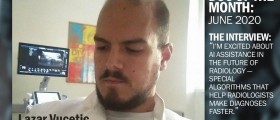Artificial Intelligence (AI) is transforming healthcare in ways we couldn’t imagine a decade ago. From early disease detection to personalized treatment, AI is reshaping how doctors, patients, and hospitals approach medicine. Early Diagnosis: AI algorithms can analyze medical images (like X-rays, MRIs, CT scans) with accuracy comparable to radiologists. This helps detect diseases such as cancer, heart conditions, and neurological disorders earlier than traditional methods. Personalized Medicine: AI studies patient history, genetics, and lifestyle to recommend treatments tailored to each individual, rather than using a “one-size-fits-all” approach. Virtual Assistants & Chatbots: Patients can now get instant answers to health questions, medication reminders, and even symptom checks through AI-powered assistants. AI in Drug Discovery: Instead of taking years, AI speeds up drug development by predicting how new compounds will react in the human body. Hospital Operations: AI helps reduce wait times, optimize staff schedules, and manage medical records more efficiently—making healthcare smoother for patients and doctors. Of course, there are still challenges like data privacy, cost, and ensuring human oversight, but the direction is clear: AI isn’t replacing doctors—it’s empowering them.
Loading...







